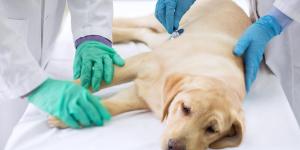My Cat Has an Upset Stomach



See files for Cats
It can be difficult to tell if a cat is in pain. They are particularly good at hiding when they feel discomfort, so it is incumbent upon their guardians to ensure we are observant of any symptoms. When a cat has an upset stomach, they may feel pain which we cannot detect. This is especially so if their stomach is only a little upset. For this reason, we need to watch out for other possible symptoms and clinical signs. Unless the digestion problems are mild, specific and resolve themselves on their own, we will need to take the cat to a veterinarian.
At AnimalWised, we find out why my cat has an upset stomach. Not only do we look at the causes of stomach issues in cats, but we find out the symptoms which can alert us to these problems and what treatment options may be available.
How to know if a cat has an upset stomach
When a cat has an upset stomach, it will be due to something affecting their gastrointestinal system. The underlying cause may not be digestive in origin, but their stomach is part of their digestive system. The symptoms and clinical signs of an upset stomach in cats are both physical and behavior. They include the following:
- Soft stools: the consistency may not be liquid, but the condition of a cat's stool an reveal a lot about their wellbeing. Softer stools may be a sign of a slight upset stomach.
- Diarrhea: more advanced stomach upset may mean their stools are liquid and the cat defecates with greater frequency.
- Blood or mucus in stools: fresh blood in a cat's feces will not originate from the stomach, but digested blood might. If there is mucus present, it also implies the presence of an infection.
- Vomiting: one of the most common symptoms of an upset stomach is vomiting or regurgitation of undigested food, bile, foam, etc.
- GI noises: when they have an upset stomach is likely you will hear gurgling noises in the cat's stomach.
- Loss of appetite: while cats will have different appetite levels, all healthy cats will eat regularly. A loss of appetite is a clean sign something is wrong, including having an upset stomach.
- Coat condition: if an upset stomach stops them from getting the right nutrition, their coat will lose conditioning and the cat can even lose hair.
- Increased appetite: although not as common, there are some causes of an upset stomach such as inflammatory bowel disease which can make the cat want to eat more.
When a cat vomits once and shows no other symptoms, it should not represent a problem. Despite this, we will still need to ensure they receive a suitable diet, as well as proper deworming and vaccination schedules. These will be determined by the veterinarian after examination.

Causes of upset stomach in cats
Once you have determined your cat does indeed have an upset stomach, we should know that most of the causes are of digestive origin. For the cat to have stomach pain, the problem may have started elsewhere, but it eventually effects the stomach. The following are the most common reasons a cat has an upset stomach:
- Parasites: kittens or adults with a weakened immune system are more likely to become infested with internal parasites. This is especially so if they are yet to have a deworming schedule implemented.
- Infectious diseases: such as panleukopenia or rotavirus in cats are characterized by causing bloody diarrhea and a characteristic odor, as well as dehydration, fever, anorexia, etc.
- Organ failure: sometimes the digestive problem is secondary to other conditions which affect internal organs. For example, renal disease or liver failure in cats.
- Poisoning: poisoning can also damage the digestive system. Toxins that affect cats can be from various sources, including medications, household cleaners and even plants that are toxic to cats.
- Foreign objects: an intestinal obstruction can also cause digestive problems. Although to a lesser extent than dogs, cats can also ingest foreign bodies such as threads, bone fragments or thorns. More common in cats is the development of hairballs due to ingestion of hair during self-grooming.
- Tumors: whether cancerous or benign, tumors can grow in the stomach and result in serious pain.
- Other conditions: any condition that manages to irritate the digestive system can cause vomiting and diarrhea, of varying intensity. In addition, cats can suffer from inflammatory bowel disease, a disorder that becomes chronic, such as malabsorption syndrome or food intolerances or allergies.
Treatment for cats with an upset stomach
The symptoms of an upset stomach in cats are generalized. This means they can be due to a range of causes, as seen above. With such a diversity of causes, there is a corresponding diversity of treatments. Some of these causes may be very mild and not require intervention. For example, if a cat has eaten too much, they may get a mild upset stomach which resolves on its own once digestion has progressed.
If a signs of an upset stomach persist, it is vital you take the cat to a veterinarian. They will be able to carry out the correct diagnostic techniques to determine the cause of the upset stomach. These may include:
- Stool sample: to look for internal parasites in the cat.
- Blood sample: for presence of infection.
- Urinalysis: can help determine if there is liver or kidney damage.
- X-ray or ultrasound: internal imaging can help to see if the cat has trauma, blockages or tumors.
Once the veterinarian has diagnosed the problem, they will determine the correct treatment. This will depend on the underlying cause. For example, a parasitical infestation will require antiparasitic drugs and the initiation of a proper deworming schedule. Bacterial infections will require antibiotics and viral infections need symptom management to help overcome the disease. Tumors and cancer need to be treated with surgical removal and/or chemotherapy.
Kittens with an upset stomach
While an upset stomach can represent a very serious issue for an adult cat, it is particularly worrying for kittens. When cats are young, their immune system has not yet developed. This gives them a particular vulnerability to digestive issues. Parasites which may even be asymptomatic in adult cats can be deadly to kittens. In particular, coccidia and giardia in cats stand out as they can be difficult to detect, but they can cause acute diarrhea.
One of the problems with kittens is that they can eliminate more fluids than they ingest. This results in them becoming dehydrated in a short space of time. In these cases, they will require immediate veterinary attention. In addition, kittens may have yet to be vaccinated. This means they can be vulnerable to infectious disease such a feline panleukopenia, for which only supportive treatment can be applied.
For this reason, it is vital we protect our kittens. This requires taking them to the veterinarian for an initial checkup and providing suitable vaccination and deworming schedules. Learn more about the diseases which can affect young kittens with our article on the prognosis of cats with panleukopenia.

What to feed a cat with an upset stomach
If you do not know why your cat has an upset stomach it is vital you take them to a veterinarian for examination. This is so they can determine the underlying cause and prescribe treatment. Once this has happened, you should be advised on what they can and cannot eat. If your cat has a mild upset stomach, you may still want to provide a soft diet for them. This should include:
- It is normal for a cat with an upset stomach to be weak after not eating. They will likely not show much interest in food, so you will need to encourage their appetite. We can begin by offering them food which is more palatable. Cats generally find wet food more appetizing than dry feed. The softer texture can also make them want to eat more. We can even make homemade food for cats as long as we use suitable ingredients.
- If our cat suffers from a chronic gastrointestinal disease, the vet should prescribe a diet specific for their needs. The same applies if they have kidney, liver or other types of organ failure. We must follow these guidelines closely as other foods can trigger symptoms.
Although you will need to ensure you follow the guidelines from your vet, you can take a look at our related article to see a diet for cats with kidney disease.

This article is purely informative. AnimalWised does not have the authority to prescribe any veterinary treatment or create a diagnosis. We invite you to take your pet to the veterinarian if they are suffering from any condition or pain.
If you want to read similar articles to My Cat Has an Upset Stomach, we recommend you visit our Intestinal problems category.







